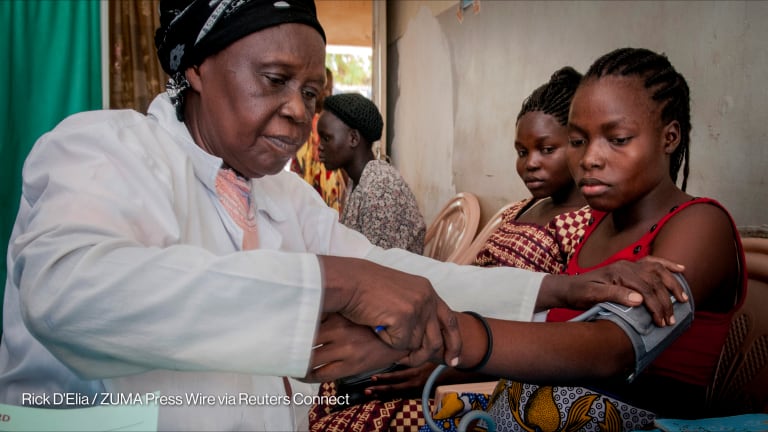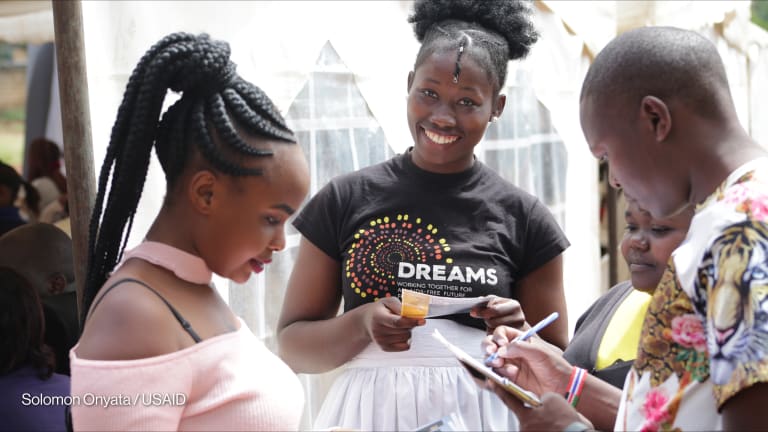
Edith Asamani knows a thing or two about resilience. As a young adolescent girl hungry for education, her family couldn’t afford to continue to send her to school. Instead of dropping out of secondary school, Edith began working in a custard factory to pay her own tuition. While working, she was sexually harassed by older male employees — not once, not twice, but more times that she can remember. Even in the face of abuse, she refused to give up. She paid for her own secondary school, high school, and eventually went on to graduate from university.
Today, Edith is a Conference Manager for the 7th Africa Conference on Sexual Health and Rights, just as she works hard to ensure that adolescent girls and young women have access to the education for which she fought so hard. Edith is not alone in fighting the good fight. She is one of 400 Women Deliver Young Leaders in more than a 100 countries, who, like millions of other young people, steps up, takes charge, and changes the world every day. They inspire me to be a better, stronger and louder advocate for gender equality and the health, rights, and well-being of girls and women.
The world is at a turning point. Half of the world’s population is under 30 years old, 600 million of whom are adolescent girls. It is their opportunities, needs, actions, voices, and choices — including reproductive choices — that will define not only our collective future, but our shared present.
This week, at the Global Adolescent Health Conference in Ottawa, organized by the Canadian Partnership for Women and Children’s Health, Every Woman Every Child, the Partnership for Maternal, Newborn, and Child Health, and the World Health Organization, and supported by Women Deliver, adolescent girls take center stage. It’s about time.
See more related topics:
► Opinion: Women and girls are greatest return on foreign assistance investment
► How the legal system is failing to protect women and girls from sexual violence
Every day, across the world, adolescent girls defy barriers and overcome obstacles, the likes of which many of us will never know, simply to live their lives. Gender norms render girls more likely to perform the bulk of household chores, and far less likely to attend school than boys, and leave girls more vulnerable to violence and poverty. Despite this, they continue to deliver for their families, for their communities and for themselves. It’s time for us to deliver for them.
Investing in adolescent girls is the right thing to do and the sound thing to do. Here are three ways the world can invest in our girls.
1. Invest in adolescent girls’ ability to learn and earn.
We need to provide all girls with equitable and quality education at every level. Every additional year of schooling for a girl is estimated to increase her future earnings by 10 to 20 percent, significantly reduce her risk of being married off as a child, as well as dying in pregnancy or childbirth. Yet various barriers continue to deny this right to the 62 million girls who lack access to quality education. While there is almost parity in primary school, way fewer girls graduate secondary school. But for example, investing proper nutrition, in water, sanitation and menstrual hygiene facilities in schools could reduce absenteeism and reduce the incidence and severity of illness among students. This one solution could lead to a tidal wave of education for adolescent girls.
2. Investing in sexuality education, including for girls and young women.
Access to education for adolescents also means education about sex and body — beyond biology. Investing in comprehensive sexuality education is linked to delaying first sexual intercourse and an increase in safe sexual behavior, which cuts down on unwanted pregnancies and sexually-transmitted infections, including HIV infection. No matter one’s age, everyone should be able to know how their body works, to choose their partner, to have a pleasurable sex life, to plan if and when they have children, and to always, unquestionably have the power over their own body.
3. Meet the demand for modern contraception and reproductive health, regardless of age.
Adolescents don’t just need the ability to obtain contraception; they also need to be treated with respect and dignity when they do. Providing girls and women with needed sexual and reproductive health care and information is estimated, on average, to cost just $25 per woman per year — and could prevent 52 million unintended pregnancies. When girls and young women have the ability to control their own fertility, they are able to plan for their futures.
Over the last year, the Canadian government has taken on these issues, and become a world-leading champion of girls and women, with a strong focus on gender equality and their sexual and reproductive health and rights.
The meeting in Ottawa is a testament to this, and it couldn’t come at a more critical time. The future of the world’s young women is everybody’s future. The adolescent girl is the face of courage, strength, and resilience. They are not vulnerable victims; they are powerful changemakers, just like Edith.
Adolescent girls don’t need anyone to define or empower them — millions of them are already doing it for themselves. Instead, we need to support, invest in and involve adolescent girls so that their future is defined by choice, not coercion, and to ensure that their voices are heard and heeded. Edith is proof positive of all that adolescent girls can and do accomplish. Let’s do our part to make that just a little bit easier.
Join the Devex community and access more in-depth analysis, breaking news and business advice — and a host of other services — on international development, humanitarian aid and global health.








